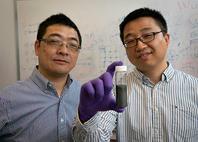Rare element to provide better material for high-speed electronics
Nature Electronics recently published an article detailing the tellurene collaborative research between Purdue Industrial Engineering and Purdue Electrical and Computer Engineering. The project is headed by Wenzhuo Wu, assistant professor in Purdue's School of Industrial Engineering and Peide Ye, Purdue's Richard J. and Mary Jo Schwartz Professor of Electrical and Computer Engineering.
"Tellurene is a multifunctional material, and Purdue is the birthplace for this new material," said Wu. "In our opinion, this is much closer to the scalable production of two-dimensional materials with controlled properties for practical technologies."
Condensed from Rare element to provide better material for high-speed electronics by Kayla Wiles (Purdue University News, May 24, 2018).
ABSTRACT
Field-effect transistors made from solution-grown two-dimensional tellurene
Yixiu Wang1, Gang Qiu2, Ruoxing Wang1, Shouyuan Huang1, Qingxiao Wang2, Yuanyue Liu3,4, Yuchen Du1, William A. Goddard III3, Moon J. Kim1, Xianfan Xu1, Peide D. Ye1, Wenzhuo Wu1
1Purdue University, West Lafayette, IN, USA
2University of Texas at Dallas, Richardson, TX, USA
3California Institute of Technology, Pasadena, CA, USA
4University of Texas at Austin, Austin, TX, USA
doi: 10.1038/s41928-018-0058-4
The reliable production of two-dimensional (2D) crystals is essential for the development of new technologies based on 2D materials. However, current synthesis methods suffer from a variety of drawbacks, including limitations in crystal size and stability. Here, we report the fabrication of large-area, high-quality 2D tellurium (tellurene) using a substrate-free solution process. Our approach can create crystals with process-tunable thickness, from a monolayer to tens of nanometres, and with lateral sizes of up to 100 µm. The chiral-chain van der Waals structure of tellurene gives rise to strong in-plane anisotropic properties and large thickness-dependent shifts in Raman vibrational modes, which is not observed in other 2D layered materials. We also fabricate tellurene field-effect transistors, which exhibit air-stable performance at room temperature for over two months, on/off ratios on the order of 106, and field-effect mobilities of about 700 cm2 V−1 s−1. Furthermore, by scaling down the channel length and integrating with high-k dielectrics, transistors with a significant on-state current density of 1 A mm−1 are demonstrated.

